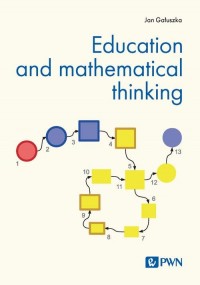
| Dane szczegółowe: | |
| Wydawca: | Naukowe PWN |
| Format: | epub, mobi |
| Ilość stron: | 98 s. |
| Zabezpieczenie: | plik z zabezpieczeniem watermark |
| EAN: | 9788301242022 |
| Data: | 2025-04-08 |
99.00
pozycja dostępna
Wyślemy w czasie: 24 h
×
Opis e-booka:
Książka zapełnia lukę między podejściami w opracowaniach dotyczących edukacji matematycznej. Wskazuje, co w edukacji matematycznej jest najistotniejsze oraz, co powinno być uwzględnione w każdym realizowanym podejściu, tak aby edukacja matematyczna była w pełni prawidłowa i zgodna z aktualną wiedzą oraz wartościowa poznawczo.
E-book „Education and mathematical thinking” - Wydawca: Naukowe PWN. Cena 99.00 zł. Zapraszamy na zakupy! Zapewniamy szybką realizację zamówienia.
Spis treści:
Introduction 9
1. Mathematical thinking – concept outline 15
1.1 Levels of mathematical thinking 15
1.2 Development considerations for mathematical thinking 18
2. Communication in mathematical education 23
2.1. The role of language in mathematical education 23
2.1.1. Formal language 23
2.1.2. Paraformal language 24
2.1.3. The language of mathematical communication 25
2.1.4. Language and mathematical thinking 26
2.2. Types of communication 26
2.2.1. Linguistic communication 27
2.2.2. Extralinguistic communication 28
2.2.3. Remote communication. IT-supported communication 28
2.3. The inherent layer of communication 29
3. Structure of educational communication 31
3.1. The spiral nature of the educational process 31
3.2. Exemplification 32
4. The specific nature of early school mathematical education 35
4.1. Reifications of algebraic systems 37
4.2. Reifications of deductive reasoning 43
4.3. Theories – formal foundations 44
4.3.1. Formal foundations 44
4.3.2. Proofs 45
4.4. Why logic theories in early school education 47
4.5. Examples of logic theories 47
4.5.1. Lorenzen’s theory (L) 47
4.5.2. Theory L – educational aspect 49
4.5.3. Rhythms as logic theories (R (m) ) 53
4.5.4. MIU-theory 59
5. Intuition 61
6. Educational problems 63
6.1. Educational irregularities – mathematical thinking 64
6.2. Early school education 71
7. Educational controversies 73
7.1. Mathematical content 73
7.2. Metalogic deficiencies 75
7.3. Reifications and iconisations – examples and controversies 79
7.3.1. Reifications of natural numbers 80
7.3.2. Reifications and iconisations of quotients 84
8. Possible causes of educational failures 89
Appendix 91
Index 93
Bibliography 95
1. Mathematical thinking – concept outline 15
1.1 Levels of mathematical thinking 15
1.2 Development considerations for mathematical thinking 18
2. Communication in mathematical education 23
2.1. The role of language in mathematical education 23
2.1.1. Formal language 23
2.1.2. Paraformal language 24
2.1.3. The language of mathematical communication 25
2.1.4. Language and mathematical thinking 26
2.2. Types of communication 26
2.2.1. Linguistic communication 27
2.2.2. Extralinguistic communication 28
2.2.3. Remote communication. IT-supported communication 28
2.3. The inherent layer of communication 29
3. Structure of educational communication 31
3.1. The spiral nature of the educational process 31
3.2. Exemplification 32
4. The specific nature of early school mathematical education 35
4.1. Reifications of algebraic systems 37
4.2. Reifications of deductive reasoning 43
4.3. Theories – formal foundations 44
4.3.1. Formal foundations 44
4.3.2. Proofs 45
4.4. Why logic theories in early school education 47
4.5. Examples of logic theories 47
4.5.1. Lorenzen’s theory (L) 47
4.5.2. Theory L – educational aspect 49
4.5.3. Rhythms as logic theories (R (m) ) 53
4.5.4. MIU-theory 59
5. Intuition 61
6. Educational problems 63
6.1. Educational irregularities – mathematical thinking 64
6.2. Early school education 71
7. Educational controversies 73
7.1. Mathematical content 73
7.2. Metalogic deficiencies 75
7.3. Reifications and iconisations – examples and controversies 79
7.3.1. Reifications of natural numbers 80
7.3.2. Reifications and iconisations of quotients 84
8. Possible causes of educational failures 89
Appendix 91
Index 93
Bibliography 95

